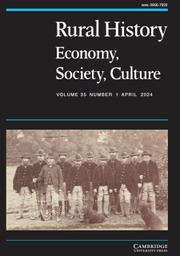Northumberland and Durham were at the forefront of eighteenth-century agricultural improvement, and this correspondence illustrates the role of determined individuals in increasing production, which in turn transformed the landscape and society of Northumberland. These letters provide a rich account of the day to day preoccupations with breeding and marketing stock, the cultivation and condition of crops, and the hiring of trustworthy farm servants skilled in new techniques. The 242 letters were written between 1798 and 1804 by the Culley brothers, based in Glendale in Northumberland, to their steward John Welch, who managed their farm at Denton near Darlington, a hundred miles south. The volume compliments Anne Orde's edition of the Culleys’ Travel Journals and Letters 1765–1798 (London, 2002).
Livestock was their passion, but arable prices underwrote the spread of their farming over 3000 acres by the later 1780s. Cheaper land had brought the brothers to Northumberland in the 1760s, leaving the family farm at Denton to be worked by their father and then a tenant. Only in 1798 did they decide to farm it themselves, partly to access more profitable markets. Hence these letters directing operations from afar. The Culleys marketed their produce and stock across northern England and southern Scotland, and encouraged farmers to adopt their bloodlines. Their association with Robert Bakewell and Arthur Young gave them a national profile, and George Culley published Observations on Live Stock (1786) and co-authored the Reports on Cumberland and Northumberland for the Board of Agriculture (1794). The Culleys also maintained correspondence with farmers they met on their travels around England. As Anne Orde notes in her Introduction, this communication was central to the dissemination and refinement of techniques, as changing practices followed from face-to-face contacts as much as via print. The letters published here, however, mainly concern the running of their Denton farm. The instructions to their farm manager reveal in remarkable detail the mechanics of commercial farming, with information on prices, banking and marketing strategies, as well as efficient farm work. On his death, the Farming Magazine in 1813 noted George's ‘great attention to minutiae, unremitting industry and superior cultivation’. The letters attest to these qualities, as well as a godly approach to the rewards of honest industry. The reward was significant wealth; George purchased Fowberry Tower for £45000, where his son preferred architectural rather than agricultural improvements.
I lent Farming Letters to my father, whose own passion is Guernsey cattle. His verdict was that he enjoyed the excellent Introduction, which provides a concise account of the Culley's place in agricultural improvement, but found the letters too concerned with minutiae to read for pleasure. This minutiae will interest researchers investigating the workings of agriculture and markets at the turn of the nineteenth century. There is less information on regional or family life than might be expected, and the more pressing context was war with France, which affected prices and impinged on labour through the requirement to raise volunteer troops. The only excitement is the rumour of a French invasion in January 1804.


